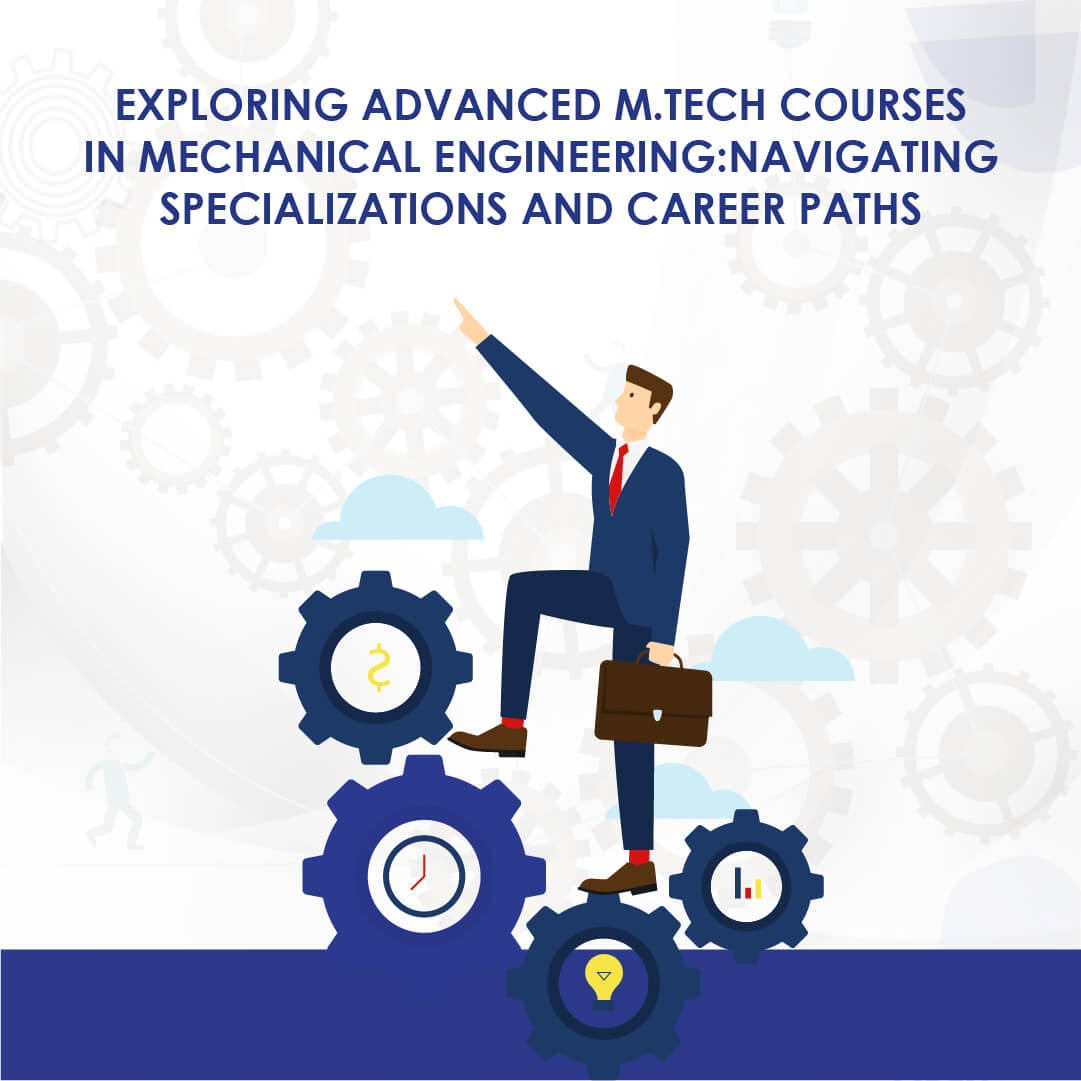Understanding the Journey: PhD in Computer Science - Achieving Excellence in Research

Computer Science and Engineering (CSE) is the most popular engineering branch today. The reason behind its popularity lies in the surging demand for technology-driven solutions across industries and its ever-evolving landscape. With a huge demand for CSE graduates, it has a plethora of options in the job market.
However, if you are someone who desires to go beyond the surface and immerse yourself in deeper exploration and innovation, a PhD degree in computer science offers a transformative journey. Ph.D. in computer sciences is the most influential technology doctoral degree, which leads to the creation of innovative, futuristic technologies.
In this blog, we will delve into the Journey of PhD in Computer Science and guide you towards Excelling in Research.
The Significance of Pursuing a PhD in CSE
Nurture Your Intellectual Curiosity: Pursuing a Phd. in CSE is a way to quench your thirst for knowledge and explore the limits of computer science.
Become a Professional Researcher: With a CSE Ph.D., one is ready to research and explore new grounds in technology.
Build a Career Network: You also connect with top industry professionals while pursuing a part-time Ph.D. in computer science or an online Phd. degree in computer science. These connections may offer you chances for teamwork and career opportunities.
Set Yourself Apart from The Competition: A Ph.D. in CSE is added to your resume, which makes you stand out from competitors and tells employers that you are smart, have high critical thinking ability, and are dedicated to lifelong learning.
Research Focus in PhD CSE
- Internet of Things (IoT) & Industrial Internet of Things (IIoT): Explore the connections of devices, sensors, and systems in IoT, especially IIoT to transform industries like manufacturing, healthcare, and energy for effective data sharing, automation, and informed decision-making.
- Artificial Intelligence (AI) and Machine Learning (ML): Study advanced AI and ML algorithms and models that allow machines to learn from data, reason, and make predictions across applications including autonomous vehicles, natural language processing, and intelligent decision-making.
- Data Science and Engineering: Investigate methodologies, algorithms, and tools for analyzing and extracting insights from large datasets, bridging the gap between theory and practice to solve real-world problems through data-driven decision-making.
- Networks, Distributed Systems & Security: Discover innovative approaches to network architecture and protection, from network protocols through cloud computing, wireless networks, and network security, for dependable and secure communications.
- Software Engineering: Principles, practices, and tools for scalable software development, addressing challenges such as software design, testing, maintenance, and evolution to produce high-quality and reliable software systems.
- Programming Languages: Investigate different programming paradigms, new programming languages, and tools that enhance productivity, modularity, and safety, especially for different domains and applications.
Doctoral Program Structure
Doctoral programs or PhD in Computer Science and Engineering require students to complete coursework, research, and dissertation stages. During coursework, students learn fundamental and advanced CSE concepts. Later, they conduct original research guided by faculty advisors, culminating in a dissertation where they present their findings. This journey takes 4-6 years of full-time study.
Advancement of knowledge: Research contributes to CSE by discovering new knowledge, developing new technologies, and recommending new solutions to complex issues. This promotes advancement and development in the area.
Addressing societal challenges: CSE research could be a way to resolve major issues in a society like improving the health care system, ensuring cybersecurity, improving energy efficiency, and developing eco-friendly technologies, among others.
Building upon existing work: Research builds upon prior knowledge and findings, establishing a cumulative body of work. By contributing new insights and discoveries, researchers can expand the knowledge base, refine existing theories and methodologies, and open new avenues for exploration and development.
Education and training: Research in CSE is of paramount importance in education and training, as it enables students to put into action, think, and become knowledgeable about new technologies and methodologies. Also, research contributions enrich the curriculum and create opportunities for faculty mentorship and student collaboration.
Skills and Expertise Development
Research skills: Research questions, experiments, data, and conclusions.
Analytical skills: Critical thinking, problem-solving, and data analysis.
Technical skills: Computer programming, data analysis, software development, and mastery of research tools and technologies.
Leadership skills: Mentoring, collaboration, and project management.
Interdisciplinary skills: Interdisciplinary work, involving experts from different backgrounds, and drawing on knowledge of several domains.
Preparation for careers: Pre-career readiness, preparing for technical and analytics advanced level.
Career Trajectories After PhD
A Ph.D. in computer science can open many opportunities for a variety of careers. Some of the popular career paths after a Ph.D. in CSE include:
- Professors
- Software developers
- Data scientists
- Technology consultants
- Research scientists
- Product managers
- System engineers
- IT directors
Specializations in niche areas like game programming, artificial intelligence, and cryptography can lead to unique job opportunities. Freelance consulting or starting a tech-based business venture are also viable career paths. The possibilities are endless for those who pursue a Ph.D. in CSE from a reputable university like MIT AOE.
Future Trends in CSE Research
- Artificial intelligence and robotics: With the industrial robotics market projected to exceed $80 billion by 2024, the future of research in this area will focus on developing advanced AI algorithms and robotics systems that can perform complex tasks efficiently and autonomously.
- Big data analytics: With the increasing volumes of data, research in big data analytics will be about creating new methods and tools for analyzing data and uncovering useful information that can be applied to make decisions or predict outcomes, hence, assisting businesses and organizations to make data-driven decisions or predictions.
- Computer-assisted education: As technology is increasingly integrated into education, research in computer-assisted education will involve designing interactive learning environments, adaptive educational tools, and personalized instructional processes to support traditional pedagogy and advance student learning.
- Bioinformatics: Bioinformatics research will concentrate on the creation of algorithms and computational methods for the evaluation of biological information including genomics, proteomics, and complex biological process identification, the new drug target discovery, and health improvement.
- Cyber security: Research in cyber security will focus on developing advanced techniques and technologies to detect and respond to cyber threats, secure networks, and systems, and preserve confidentiality in data.
Admission and Eligibility for Ph.D. in CSE
Eligibility
- Master's degree in CSE or related field with a minimum of 55% marks.
- GATE (Graduate Aptitude Test in Engineering) score or UGC/CSIR JRF/NET/SLET/Teacher Fellowship holder.
- Qualifying written test and interview conducted by the university or MIT AOE.
Admission Process:
- Fill in the online application form together with the necessary documents like GATE score, transcripts, research proposal, etc.
- Take the written test administered by MIT AOE
- The shortlisted candidates will be invited for an interview.
- Selection of the best candidate based on the written test, interview, and research proposal.
Conclusion
In a rapidly evolving field, the demand for those with a Ph.D. in Computer Science and Engineering is on the rise. Pursuing this advanced degree can be both demanding and fulfilling, opening a world of opportunities for individuals in the technology industry.
If you are looking for a reliable institute for your PhD in CSE, MIT AOE might be just what you need. With cutting-edge facilities, renowned professors, and a dedication to fostering ingenuity and progress, MIT AOE stands out as an excellent institution. Join our tight-knit community and let us collaborate to shape the future of technology. Begin your journey today by contacting us.
OUR RECENT BLOG



